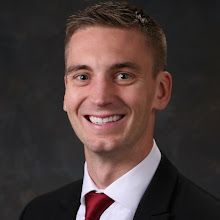To describe an experience in Iraq, or any other theater, one of the most basic elements is the climate. Though one can never do justice to an area with simply words, I will try my best to convey some of my memories here.
Background

Balad is 42 miles northwest of Baghdad. LSA Anaconda is shortly outside of town and covers an area of 15 square miles. 22,000 people lived on the base, and we were attacked by mortars or rockets an average of twice daily during my time there. It lays in the heart of an area known as the Sunni Triangle, which is where roughly 80% of attacks against coalition forces occurred during my time there. To the right is a picture of me holding some shrapnel from a mortar round that almost hit me. (http://www.globalsecurity.org/military/world/iraq/balad-ab.htm)
We wore boots, socks, full pants, DCU top (long sleeve, button up), belt, body armor (30 pounds, thick and doesn't breathe), 210 rounds of ammo (7 pounds), M16 (7.8 pounds), 2 liters of water (4.5 pounds), helmet (3.5 pounds), and sunglasses. Other incidentals to carry included food, pictures, books, Ipods, and anything else someone might want to have with them.
Description
Scorching heat, 120 degrees in the shade. Felt like well above that. We lived in tin shipping containers where the A/C worked half the time. The problem was that the A/C primarily worked when it wasn't too hot, because once it got unbearably hot the generators that powered them would stop working. Computer parts, flash drives, and other things with meltable components can't be stored in pockets or in hooches for too long lest they melt something. I generally did my work at night and would try to sleep in the day. Sweating through the mattress and hallucinating from the excessive heat and exhaustion in a state of half-sleep, half-awake that plagues a person for weeks at at time.
The ground there was a hard rock and dust mixture that we described as moon-dust. The dust was extremely fine, similar to flour. If you stepped on a pile of it it would all fly up into the air. The ground beneath it was as hard as cement. Mortar rounds that caused craters a foot deep and several feet across in Minnesota barely made a dent in the ground in Balad. In this way we were not in a traditional desert, as there wasn't really much sand to speak of when compared to Kuwait or other areas.

The sun didn't stop shining for months at a time. There were a few months when no clouds were visible at all. It never occurred to me that clouds might be something rare to see. Then during the rainy season (January and February 2005 when I was there), we had floods and had to dig trenches to divert water.
Overall, these parts of the experience were amazing, living in a new climate with new challenges and opportunities. During times when it was peaceful and we didn't have something to do, it felt in many ways similar to how studying abroad or vacationing would feel.



